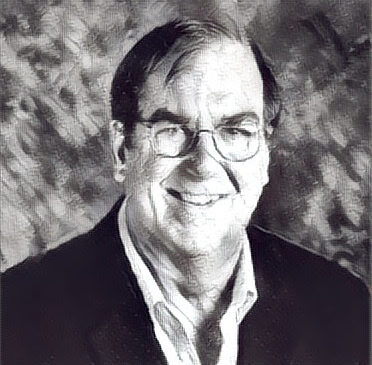Moving To The Cloud in 2012
 I told a friend recently that I wanted to “move to the cloud” in 2012. He asked, “What does that mean?”
I told a friend recently that I wanted to “move to the cloud” in 2012. He asked, “What does that mean?”
It means dematerializing life as much as possible. Fewer possessions. Fewer claims. Less “stuff” to worry about. And that is a good thing.
I’m more interested in having access than I am in ownership. If I can get all music on Spotify, why do I need a CD collection? If I can get access to personal transportation with Getaround or Zipcar, why own a car? Do I really need a closet full of clothes that I haven’t worn in years? Wouldn’t those family albums be better if they were scanned and put online where they could more easily accessed, by more members of the family? From anywhere? At any time?
But really, what’s involved in moving to the cloud? How do I explain it?
Let me describe what I mean in terms of networks. After all, we live our lives at the intersections of various networks:

Communications Network. We are already members of communications networks, and most of them are already in the cloud. Telephony, especially mobile telephony, is not tethered to anything physical (other than the phone). It works everywhere. In my case, my 8×8 VOIP “landline” phone gives me “650-428-1395” dialtone from any internet connection in the world. And my faxaway.com fax mailbox forwards incoming 206-279-4741 faxes to my email inbox.
Email, Skype, Twitter and social networks like Facebook and LinkedIn are already in the cloud, so “moving to the cloud” in those cases is already done.

That leaves snailmail as the last bastion of physically-determined communications infrastructure. My snailmail is 90% advertising at this point — most of my business mail and personal/financial stuff comes via email now. So, I’m tempted to abandon a “mail” address. But snailmail is still the default for most legal “contact addresses,” and it will be around for years to come. (Today’s arrival of some 1099’s reminded me of the primacy of snailmail yet again.)
So how do you move snailmail to the cloud? Well, one answer is a mail forwarding service, like Earth Class Mail. They give you a physical (street) address for your mail. They will scan each incoming envelope, and, based on your online instructions, trash it, open/scan contents, forward it unopened, or take action, like depositing checks. Very cool service. They’ll even accept and forward parcel delivery from UPS and FedEx.
 Financial Network. It’s been years since I’ve actually had to go into a bank or other financial institution to conduct my financial business. Credit cards. Online banking. ATMs. E-Bill, E-Pay and tele-banking. It’s increasingly easy to manage money, even internationally, given that most “money” has been de-materialized and represented in terms of information – e.g., balances on bank or brokerage statements, stocks held in “street name”, and e-invoices from vendors or credit card companies.
Financial Network. It’s been years since I’ve actually had to go into a bank or other financial institution to conduct my financial business. Credit cards. Online banking. ATMs. E-Bill, E-Pay and tele-banking. It’s increasingly easy to manage money, even internationally, given that most “money” has been de-materialized and represented in terms of information – e.g., balances on bank or brokerage statements, stocks held in “street name”, and e-invoices from vendors or credit card companies.
International. If you are traveling or residing outside the USA for extended periods, then getting access to financial networks or communications networks that are local to your temporary residence can save you money. A Euro-denominated credit card saves you money (and gives you the PIN access you need for POS terminals in Europe). And having a local SIM card for your mobile phone can save oodles. But that’s just cost/benefit. Not access.
Access to some services is actually blocked from certain countries. E.g., access to Netflix from Canada is blocked. Amazon restricts what can be sold where. Twitter even blocks messages in certain jurisdictions. But that can be easily circumvented by buying access to a proxy service in the country you care to reach.
 Health Network. Your “health network” is composed of
Health Network. Your “health network” is composed of
- a) the provider network for your insurance (as in the term “in-network provider”);
- b) your health records (which are slowly creeping into online formats and over-the-internet accessibility); and
- c) your relationship with your doctor(s).
The insurance/provider network (and rules, premiums, etc.) is a function of “residence / domicile” (see below) and employment. In my case, we have an individual plan thru Blue Shield, domiciled in California. We did have an emergency room visit once while on Kauai, and that was covered nicely. I’m not sure about what would happen if we spent a month in Buenos Aires or Bangkok. I’m not sure Medicare or Medigap (when I get there) would cover me. I think, with a little work and planning, I can get coverage worldwide, even if I’d have to pay “out-of-network” rates. I need to know more here.
Our medical provider (the Palo Alto Medical Foundation) has had electronic patient medical records available for a decade or more. But I don’t have read-only access to it, nor would, I suspect, a physician in Buenos Aires, Bangkok or even Kauai. The next step is to get my medical records off the client/server system in the PAMF building and available online and accessible to me and whomever I authorize.

“Visiting” a doctor for an “exam” is, in 2012, still an inherently local and physical activity. But let’s deconstruct it a bit. How often does the doctor send you to a lab or imaging center to get diagnostic tests or images? And then what does s/he do? My doctor reads the reports/pictures and advises me on what to do next. He faxes the prescription, if any, to a pharmacy near my home. How about you and your doctor?
Most / much of this activity can be done over a good video conferencing system, of the sort being supported now by Vidtel. Labs that draw blood and run tests are everywhere, as are imaging centers. If results were posted back online (as tests are now), then I can already see how I can keep my relationship with my doctor and call in from anywhere in the world for advice or even annual check ups. Of course, I’ll be here in CA often enough … but I’d like to drive much of this activity online, untethering me if I want to travel or work from other locations.
Work / Collaboration. Face-to-face communication and collaboration still have great value, and that’s a major plus for being in places with concentrations of talented others – like the San Francisco Bay Area or New York City. Much has been written about the serendipity that occurs when talents and ideas collide in close proxity and how “clusters” of world-class competitors (and their supply chains) tend to be geographically proximate for that reason.
But increasingly, knowledge work is abstracted and moving online, and people are discovered, hired, managed and paid without meeting physically. It’s not unusual for some of the startups Nodal Partners backs to have staff in different cities, or even different countries. Recently, I was referred to a hardware design engineer in North Carolina by a senior exec with a circuit-board developer here in SF with the comment, “This guy is great. He’s honest and super smart. He’s done a bunch of work for us, all top-rate. Funny, I’ve never met him face to face, but I feel Iknow him very well.”
When I’m working with folks here in the Bay Area, much of the time I’m on the phone or in a video conference. I’ve even done that from Kauai without them knowing (or caring) that I wasn’t “home” in California. That said, I do think you need to be face to face to maintain relationships, especially when the work is not well-formated or obvious. I could be wrong about that, but I believe it be so, at least for now.
 Entertainment – Education. I am very happy to have “cut the cable” and unhooked from the broadcast / live TV world. I had already moved from “live” to “tivo’ed” TV, but now I get all my “TV” over the internet, with services like Hulu, Amazon, Netflix and some “channels” that [re-]broadcast TV shows, with or without permission from the rights holders. (I suspect some may be pirates, but I can’t really tell.) I’m waiting for HBO to sell pay-per-view or offer an a la carte channel over IP TV.
Entertainment – Education. I am very happy to have “cut the cable” and unhooked from the broadcast / live TV world. I had already moved from “live” to “tivo’ed” TV, but now I get all my “TV” over the internet, with services like Hulu, Amazon, Netflix and some “channels” that [re-]broadcast TV shows, with or without permission from the rights holders. (I suspect some may be pirates, but I can’t really tell.) I’m waiting for HBO to sell pay-per-view or offer an a la carte channel over IP TV.
YouTube is increasingly a source of video discovery and entertainment, and that’s available from anywhere. Video entertainment and education on the internet is exploding.
Music delivered online from my iCloud service, Pandora, Spotify, Grooveshark, Turntable.fm, Swift.fm. Last.fm and others offer me more than I can listen to. Why own a “stereo” any more? Does anyone still have a turntable? (Do you ever say “hi-fi”? <smile>)
Learning opportunities? Well, the web is one giant learning hairball for those with curiosity — TED.com, iTunes U, podcasts, Open.Yale.edu (and other college courses online), Udemy, Codecademy, etc.
Residence/Domicile. I’m finding, especially regarding things like taxation and legal matters, that many contractual counterparties and governments assume you have a single “principal place of business” and a “permanent residence” in a specific geography, in this case, California. There is a hodgepodge of rules regarding things like “second homes” or “temporary” living quarters. Tax treatment, voting, entitlements, enforcement of contracts, drivers’ licenses, and other significant aspects of your life turn on which state or country is your “permanent” residence or place of business. Domicile is legally relevant, yet increasingly manipulable, as we abstract our lives and live more in the cloud.
Again, let’s dig deeper: Permanent residence and “domicile” is a matter of intention… namely of “remaining indefinitely” – a very fact-based determination. It has nothing to do with owning or renting. I could own a house here and travel the world for 9 months a year. I’m still a California resident, if this is where I “live” and plan to return.
But intention can change that. What happens if someone has an arrangement with a bunch of resort condominiums around the world – to go anywhere and stay here, or there, or wherever? What is their domicile then? What if they keep moving, like George Clooney in “Up in the Air?”
Obviously, most people will have a “home” where they keep their “stuff” – probably an owned home, embedded in a community, with a network of tangible, local relationships. But what if your friends are all over the world, if the network of your relationships is defined by common interest or experience and not by geography? Can your “permanent address” be, simply, wayne@willisdomain.com? The answer, not yet. We live in the physical world and governments and counterparties want to “know where you live” … literally. So, you need to declare your spot and plant your personal flag there, even if you spend a lot of time “away from home.”
Tangible Personal Property. As I understand more and more the toll that property exerts on its owner, I want less of it. I really enjoy sailing on SF Bay, but I don’t want to own a sailboat. It’s much better to rent one (or borrow one) when I want to go … and not slave with upkeep, insurance, security, etc. Same with any tool that’s intermittently used, especially if the need can be anticipated / scheduled and the overhead of check out / check in is low. Zipcar and Airbnb are perfect examples of “collaborative consumption” models that make increasing sense as the transaction costs are decreasing.
Some things can’t be shared, but can be reduced: Clothing, especially in these casual times, can be simplified to many fewer items … and even cached in various locales, like Kauai or San Jose.
The critical thing is not ownership. It’s access. With our iPad, we can access most of the content I care about online. I’m selling all my books and CDs. I can get back to them anytime I want, online.
The best things in life are not material: time with family, being productive, enjoyment of great art, learning something new, forging or extending relationships, teaching something useful … just being.
The material world demands attention and distracts us from these essentials. So, I’m moving to the cloud and focusing my time and attention to these more essential facets of life. More to follow!

